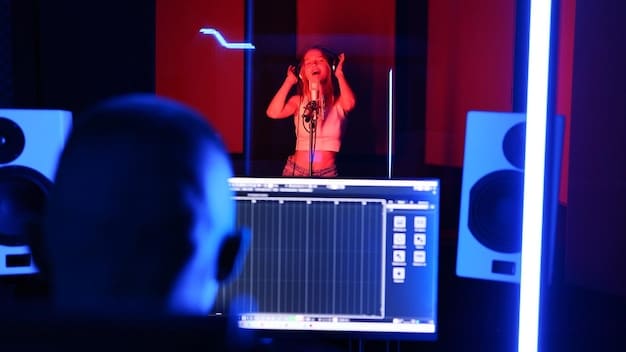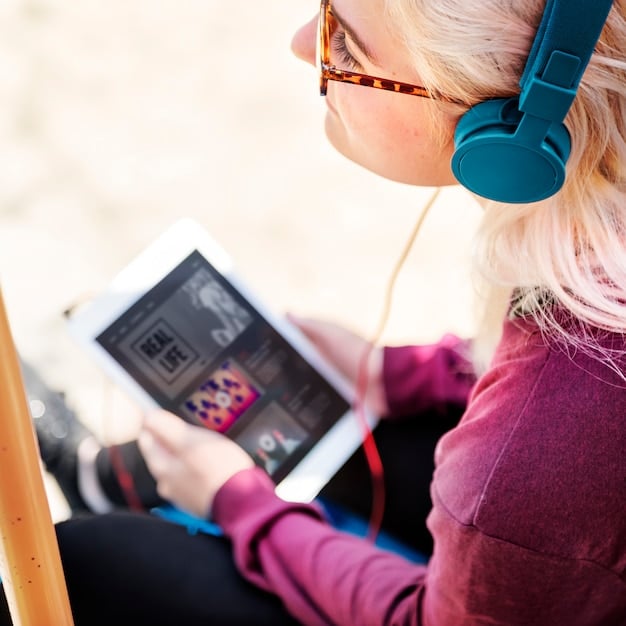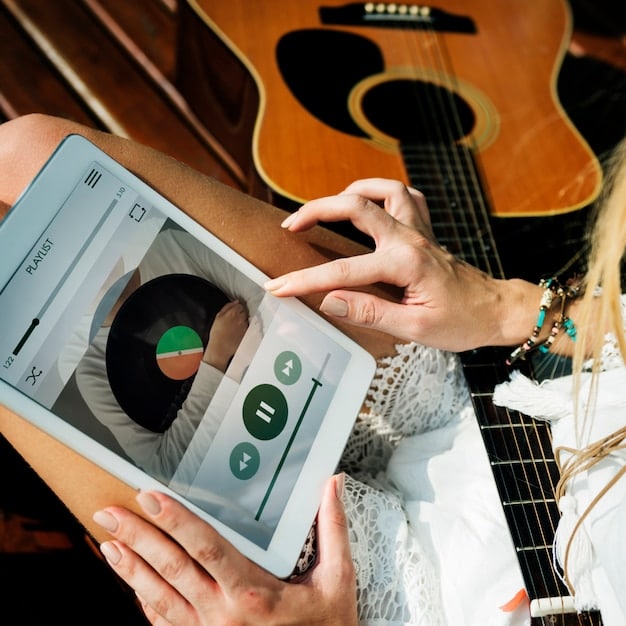The Impact of AI on Music Production: Next 6 Months Forecast

The Impact of AI on Music Production: What’s Coming in the Next 6 Months? is poised to revolutionize music creation, offering new tools for composition, mastering, and personalized listening experiences while also raising important questions about artistic authenticity and copyright.
The music industry is on the cusp of a significant transformation, largely driven by the rapid advancements in artificial intelligence. The Impact of AI on Music Production: What’s Coming in the Next 6 Months? promises a wave of innovation, disrupting traditional workflows and opening up unprecedented creative possibilities for artists and producers alike. Get ready to explore the future of music!
AI-Powered Composition Tools Emerge
The next six months will witness a surge in sophisticated AI-powered composition tools. These tools are not just about generating simple melodies; they are evolving to understand complex musical structures and styles, allowing creators to collaborate with AI to refine and enhance their artistic visions.
AI as a Creative Partner
AI is increasingly seen as a creative partner, assisting musicians in overcoming creative blocks, exploring new sonic territories, and speeding up the songwriting process. These tools are designed to augment human creativity, rather than replace it.
Personalized Music Creation
Imagine an AI that understands your musical preferences and helps you create songs tailored to your unique style. This is the promise of personalized music creation, where AI algorithms analyze vast datasets of music to offer customized suggestions and generate original compositions.
- AI-driven melody generators for instant inspiration.
- Harmonization tools that suggest chord progressions based on your lead melody.
- AI-powered drum machine that creates custom beats based on your desired genre and tempo.

As AI composition tools become more accessible and user-friendly, we can expect a surge in experimentation and innovation in music creation. These tools empower both seasoned professionals and aspiring musicians to unlock their creative potential and push the boundaries of music.
Enhanced Mastering and Audio Quality
AI is not just transforming music composition; it’s also revolutionizing the mastering process and enhancing overall audio quality. AI-powered mastering tools offer unprecedented levels of precision and efficiency, allowing artists to achieve professional-grade sound without the need for expensive studio equipment or specialized expertise.
AI-driven mastering solutions can analyze audio tracks and automatically adjust parameters such as EQ, compression, and stereo imaging to optimize the sound for different listening environments. This ensures that music sounds great on everything from smartphones to high-end audio systems.
AI Noise Reduction and Audio Restoration
AI is also playing a crucial role in noise reduction and audio restoration. Algorithms can identify and remove unwanted background noise, hiss, and other artifacts from recordings, improving the clarity and fidelity of audio tracks.
- AI-powered de-noisers that eliminate unwanted background noise.
- Automatic EQ adjustments based on genre-specific audio characteristics.
- Dynamic compression and limiting for optimized loudness.
With the help of AI, artists can achieve professional-sounding masters quickly and affordably, leveling the playing field and empowering independent musicians to compete with major label productions. This democratization of music production is a game-changer for the industry.
The Rise of AI-Generated Music Streaming
The next six months will see the rise of AI-generated music streaming platforms that offer personalized and adaptive listening experiences. These platforms use AI algorithms to curate playlists, suggest new songs, and even generate original music based on the listener’s preferences.
AI algorithms can analyze a user’s listening history, mood, and even their physical activity to create personalized playlists that perfectly match their needs. This level of customization is unprecedented, offering a highly engaging and addictive listening experience.

Adaptive Music for Video Games and Film
AI is also transforming the way music is used in video games and films. Algorithms can generate adaptive soundtracks that respond to the player’s actions or the emotional tone of a scene, creating a more immersive and dynamic experience.
Imagine a video game where the music changes in real-time based on the player’s choices, or a film where the soundtrack adapts to the emotional arc of the characters. This is the power of AI-generated music, and it’s set to revolutionize the entertainment industry.
With the advent of AI-generated music, the possibilities for personalized and adaptive listening experiences are endless. These platforms are poised to disrupt the traditional music streaming model and create a new era of music consumption.
Addressing Copyright and Ethical Concerns
As AI becomes more prevalent in music production, important questions arise regarding copyright and ethical considerations. Who owns the copyright to a song created by AI? How do we ensure that AI-generated music doesn’t infringe on existing copyrights?
The Question of Authorship
Defining authorship in the age of AI is a complex issue. Is the AI the author of the music it generates, or is it the programmer who created the AI? Or is it the musician who used the AI as a tool?
Preventing Copyright Infringement
AI algorithms are trained on vast datasets of music, raising concerns that they may inadvertently copy or mimic existing songs. Ensuring that AI-generated music is original and doesn’t infringe on existing copyrights is a major challenge.
- Developing clear legal frameworks for AI-generated music.
- Implementing AI-powered copyright detection tools.
- Promoting ethical guidelines for AI music creation.
Addressing these concerns is crucial to fostering a sustainable and ethical AI music ecosystem. Collaboration between artists, developers, and legal experts is essential to navigate these complex issues and ensure that AI benefits the music industry as a whole.
The Evolving Role of Musicians
The rise of AI in music production raises questions about the evolving role of musicians. Will AI replace musicians, or will it augment their creativity and empower them to create even more amazing music?
While AI can automate certain tasks and generate original music, it cannot replicate the human emotion, passion, and artistic vision that musicians bring to their craft. AI is a tool, and like any tool, it can be used for good or for ill.
Embracing AI as a Creative Tool
The most successful musicians will be those who embrace AI as a creative tool and learn how to leverage its power to enhance their songwriting, production, and performance. AI can help musicians overcome creative blocks, explore new sonic territories, and reach new audiences.
By combining their human creativity with the power of AI, musicians can push the boundaries of music and create truly groundbreaking works of art. The future of music is not about AI replacing musicians, but about AI and musicians collaborating to create something extraordinary.
Future Predictions and Trends
Looking beyond the next six months, several key trends will likely shape the future of AI in music production. These include the development of more sophisticated AI algorithms, the integration of AI into existing music production software, and the emergence of new AI-powered musical instruments.
AI-Powered Music Education
AI could also revolutionize music education by providing personalized learning experiences tailored to each student’s individual needs and skill level. AI tutors could provide instant feedback, track progress, and adapt the curriculum to ensure optimal learning outcomes.
As AI becomes more integrated into music education, we can expect to see a new generation of musicians who are fluent in both traditional musical techniques and AI-powered tools. This will lead to even more innovation and experimentation in music creation.
- AI-driven personalized music learning platforms.
- AI-powered music analysis tools for deeper understanding.
- Virtual reality music performance experiences.
The future of AI in music production is bright, full of exciting possibilities and endless opportunities for innovation. As AI continues to evolve, it will undoubtedly shape the way we create, consume, and experience music.
| Key Point | Brief Description |
|---|---|
| 🤖 AI Composition | AI tools are assisting in melody creation and harmonization. |
| 🔊 Enhanced Mastering | AI improves audio quality and mastering processes. |
| 🎧 AI Streaming Rise | AI personalizes music streaming and adaptive experiences. |
| ⚖️ Ethical Concerns | Copyright and ethical questions necessitate careful consideration. |
FAQ
▼
AI is providing tools for melody generation, harmony suggestions, and personalized music creation, enabling artists to explore new creative avenues and enhance their workflows.
▼
AI mastering helps achieve professional-grade sound quickly and affordably. It adjusts EQ, compression, and stereo imaging automatically to optimize audio quality across different platforms.
▼
AI analyzes listening habits, mood, and activity levels to curate personalized playlists and recommend new music. Some platforms even generate original music tailored to the user.
▼
Determining authorship and preventing copyright infringement are key challenges. Legal frameworks and ethical guidelines are being developed to address these complexities.
▼
AI is likely to augment human creativity rather than replace it. Musicians who embrace AI as a tool can enhance their skills and explore new musical horizons collaboratively.
Conclusion
The Impact of AI on Music Production: What’s Coming in the Next 6 Months? heralds a period of exciting innovation and transformation. While ethical and legal considerations need careful attention, the potential for AI to democratize music production, enhance audio quality, and personalize listening experiences is undeniable. The future of music will be shaped by those who embrace these new tools responsibly and creatively.